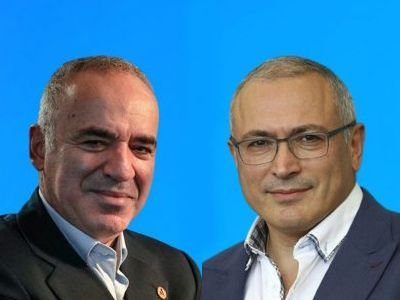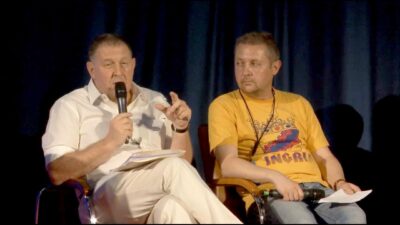Politico published an article by prominent oppositionists on how to deal with Russians who are against the criminal regime

The war in Ukraine is now well into its third year, and Western support for the country has faltered dangerously.
While the U.S. Congress did pass an aid bill after months of fitful negotiations, the assistance came late — and at great cost. In the interim, Russia took advantage of Kyiv’s shortfall in munitions, dramatically intensifying the shelling of key cities. The EU, for its part, did pass a multibillion-euro defense package in March, but the bloc remains deeply divided over the scope and type of military assistance.
In light of all this, commentary has rightly focused on the need to provide adequate support that would allow Ukraine to defend itself on the battlefield. This must remain a key area of attention. However, the West has other avenues at its disposal to help Ukraine win — and these can and must be explored too.
We speak on behalf of all the Russians who believe in the potential for a free and democratic Russia. Neither of us have been able to return home for decades because of our opposition to the regime. Thankfully, with the resources available to us, we’ve been able to establish new homes and lives for ourselves and our families in the West. But the same opportunities aren’t available to the millions of Russians who, like us, don’t support Putin’s criminal system.
At this critical juncture in the struggle for Ukraine’s sovereignty, we have an opportunity to give these Russians the chance to make the same moral choice to break with the Putin regime — and, in doing so, mobilize a key community to help Ukraine to victory.
Let us be clear about what is at stake: the freedom and self-determination of millions of Ukrainians and their government’s right to territorial integrity. But the consequences extend far beyond one country’s borders. A victory for Putin’s regime would be a clear sign that the world’s democracies aren’t able to stand together in a firm coalition to uphold their core values and support their members in need.
But we still have an opportunity to change the outcome — if we act now — and affirm that democratic institutions and values are stronger and more sustainable than what authoritarians offer.
Thus, as a vital step in the international fight for Ukraine and against Putinism, we propose the creation of a single, harmoniously operating community of pro-Western Russians, which would serve as a crucial link in the broader Western web of opposition against the regime.
Practically speaking, Russians who wish to join this group would be required to sign the Berlin Declaration, which sets out the key principles for a Ukrainian victory and a Russia without Putin. After passing the necessary checks, signatories would then be issued documents recognizing them as members of a Free Russia, which would allow them to obtain visas and enter all countries participating in the agreement.
This would create a powerful incentive for more Russians to disavow Putin and emigrate. Many of the over one million citizens who have already departed the Russian Federation are highly educated. And the more that leave Russia, the greater the “brain drain” Putin’s regime suffers, leaving fewer intellectual resources for him to develop new deadly technologies and fewer soldiers to send to the front.
Unfortunately, Russians who have left their country behind often find themselves in a state of limbo and at risk of politically motivated extradition, living, for the most part, in Georgia, Armenia, Turkey or Central Asian countries, unable to seek refuge in Europe. Many would gladly join in the fight against Putin openly. However, with expiring passports, uncertain residency and no representation, this is an impossibility.
These individuals aren’t in need of economic assistance — they’re fully capable of supporting themselves. The system we propose would give them the opportunity to help themselves, their families and the West by supporting the international struggle against Putinism openly and without fear.
If the idea sounds far-fetched or impractical, we point to a historical example that suggests otherwise: Nansen passports, developed for stateless persons in the political chaos following World War I, were issued by the League of Nations after the Russian government officially revoked the citizenship of hundreds of thousands of Russians abroad. Named after Norwegian politician Fridtjof Nansen, their chief promoter on the international stage, nearly half a million Nansen passports were issued during their nearly two-decade existence. And the office responsible for their operation was awarded the Nobel Peace Prize for its work in combating this massive displacement crisis.
While the parallel is imperfect — as historical analogs always are — the growing number of Russians disaffected with Putin’s rule today similarly stand to have their lives transformed by such international recognition. In recent days though, Norway, along with Finland, banned the entry of Russian tourists (with few exceptions for essential travel and humanitarian reasons). And while the measure signals a strong stance against Putin’s war, it offers no way of distinguishing between Russians who fall in line behind him and those who seek to disavow him. It only further points to the urgent need for an international juridical mechanism for making precisely this kind of distinction.
As the war staggers on, we must use all the resources at our disposal — military, economic and legal — to help Ukraine prevail. The establishment of an extraterritorial free Russia, so to speak, with international recognition, would mark a crucial step toward Ukraine’s victory, dramatically shifting the balance of power in the struggle between democracy and dictatorship.
We cannot shy away from the truth that victory for Ukraine entails the full defeat of Putin’s regime. The steps we take to ensure Ukraine’s future are also steps that pave the way for a free, fair and democratic Russia aligned with the West. We urge the leaders of the free world to take this proposal seriously: to bring like-minded Russians to their side of the current fight and, as a result, integrate them into the international democratic fabric.





